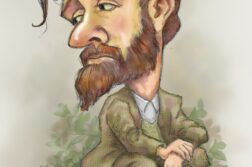Published in: January-February 2013 issue.
RECOVERING or re-framing history—creating a “people’s history”—has been important for all identity-based social movements, but it’s been crucial and particularly revelatory for the GLBT movement. Michel Foucault, quoted in Eve Sedgwick’s Epistemology of the Closet (1990), says: “There is no binary division to be made between what one says and what one does not say; we must try to determine the different ways of not saying … things. … There is not one but many silences, and they are an integral part of the strategies that underlie and permeate discourses.” What he means, I think, is that silence itself communicates specific, complex social messages, for a variety of reasons.





